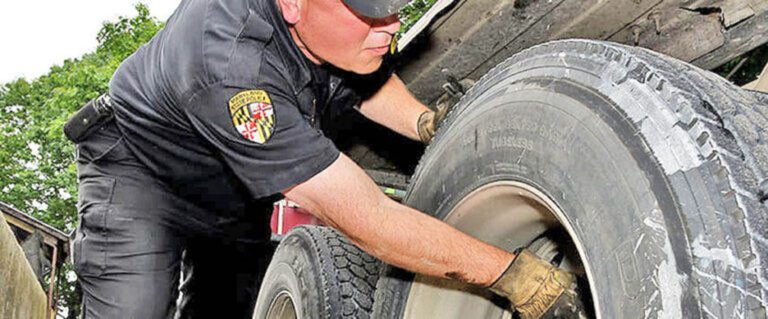AVON, Ohio — Nearly one out of five commercial vehicles inspected during last year’s Commercial Vehicle Safety Alliance (CVSA) International Roadcheck were taken off the road.
Issues with brake systems, service brakes and tires accounted for more than half of all the out-of-service vehicle violations across the U.S., Canada and Mexico.
The CVSA International Roadcheck 2024 inspection blitz is just around the next bend, from May 14-16.
Bendix Commercial Vehicle Systems is offering tips to help fleets and owner-operators prepare.
A deeper review of the findings from the 2023 International Roadcheck shows that 11,270 of the 59,429 vehicles inspected — or about 19% — were removed from roadways due to a critical finding related to the safety of the vehicle. Problems related to the brake system or brake adjustment accounted for almost 40% of all out-of-service violations found, and tire issues raise that figure to 58%.
“Many of the critical issues flagged during these inspections are maintenance-related, and many are issues that could have easily been prevented with regular, thorough maintenance procedures,” said Fred Andersky, Bendix director of government and industry affairs and technical training. “That’s why keeping vehicles in good shape is critical in helping to maintain overall safety on the road, and why CVSA’s Roadcheck — along with a regular schedule of preventive maintenance — is so important.”
Andersky added, “An essential part of this equation is ensuring that repair shops, including independent and dealer businesses, have access to the tools, training, techniques, and software to repair truck components properly – as spotlighted in the industry’s ongoing right-to-repair discussion. Getting as many shops up to speed on repairing integrated electronics and other systems benefits the entire market by helping to keep vehicles on the road and in service.”
What’s Coming
Established in 1988, International Roadcheck is a 72-hour, high-visibility, high-volume commercial motor vehicle inspection and enforcement initiative targeted at various elements of motor carrier, vehicle and driver safety. Commercial motor vehicle inspectors in Canada, Mexico and the U.S. will conduct North American Standard Inspections of commercial motor vehicles and drivers at weigh and inspection stations, on roving patrols, and at temporary inspection sites.
CVSA sponsors International Roadcheck with participation by the Federal Motor Carrier Safety Administration; Pipeline and Hazardous Materials Safety Administration; Canadian Council of Motor Transport Administrators; Transport Canada; and Mexico’s Ministry of Infrastructure, Communications and Transportation. Inspectors examine large trucks and motorcoaches, along with driver documentation and credentials, using CVSA’s North American Standard Inspection Program procedures.
An Eye on Tractor Protection Systems
Among the focus areas of this year’s Roadcheck are tractor protection systems. The aim is to increase awareness of these components — specifically, the tractor protection valve, trailer supply valve and spring brake valve. Officers will conduct inspections to confirm that the tractor protection system is functioning properly in the event of trailer separation.
“The tractor protection system inspection will vary based on the tractor protection valve that is in use on the vehicle,” said Brian Screeton, manager of technical training and service at Bendix. “The service data sheet for each valve is the best source for operational checks of that valve.”
According to Screeton, a basic, high-level test for a properly operating tractor protection system involves the trip pressures of the dashboard valves associated with the system. Begin by starting the vehicle and building full system air pressure. Then, shut off the vehicle, disconnect the glad hands and push in the red trailer-supply dash valve button. Air will leak out of the trailer supply glad hand until the red button pops out. When the button pops, apply the service brake. No air should come out of the service glad hand.
Chad Benesh, technical support supervisor and member of the Bendix Tech Team, emphasized another crucial factor in the proper operation of the system.
“It’s vital to keep the glad hand couplings clean of contaminants that may get in them when not coupled,” he said. “Contamination in the glad hand has a direct path to the trailer relay valve, which can cause loss of brakes on the trailer as well as the potential that the brakes won’t release and will drag. Make sure dummy glad hands are used when glad hands are not connected. In addition, replace worn or cracked glad hand seals.”
Brake Check
Brake systems accounted for 25% and service brakes 14% of the 2023 International Roadcheck out-of-service vehicle violations — and yet many brake issues are easily preventable through routine maintenance and regular checkups, noted Mark Holley, Bendix director of marketing and customer solutions, Wheel-End.
“First, drivers should always conduct standard walk-arounds, as well as pre-and post-trip inspections, before and after hitting the road,” Holley said. “Look for visible brake system problems such as loose hoses or damaged brake components — air chambers or pushrods, for example. You can also spot adjustment issues if you notice slack adjusters that are extended at different angles on the same axle. Keep in mind that if you’re using air disc brakes, their internal adjustment mechanism significantly lowers the risk of out-of-adjustment violations.”
Earlier, in the shop, air brake system inspections should include the following points — all of which relate to items typically inspected during Roadcheck.
These items include:
- Conducting a brake application at a pressure above 80 psi and listen for leaks.
- Measuring chamber stroke at each wheel-end to ensure proper brake adjustment.
- Examining friction for good condition (no lining cracks, missing portions, oil or grease contamination) and minimum thickness.
- Measuring and inspecting each rotor and drum for wear and heat cracking and/or leopard spotting.
“If you notice it’s time for new brake friction, make sure to keep things up to spec: Not all friction that is marketed as ‘acceptable’ under current Reduced Stopping Distance (RSD) regulations will actually perform to that standard,” Holley said. “Whether you’re replacing air disc brake pads or drum brake shoes, select components that will ensure the original equipment manufacturer (OEM) requirements are met so the vehicle remains compliant. If the friction needs to be replaced, it must be replaced on both sides of the axle.”
Holley continued, “Another critical point to remember: The performance of your braking system also affects the performance of connected safety systems. So, if the vehicle is equipped with a full-stability or collision mitigation system, it too can be negatively affected if brakes aren’t performing at their peak.”
Proper Tire Inflation Is Key
Roadcheck tire inspections emphasize the importance of maintaining proper tire pressure: Industry research shows about 90% of tire failures can be attributed to underinflation, and nearly half of all emergency service road calls are tire-related. During the 2023 Roadcheck, tire issues accounted for 19% of out-of-service vehicle violations.
“Driving on underinflated tires generates higher internal running temperatures, and that situation can lead directly to tire blowouts,” said TJ Thomas, Bendix director of marketing and customer solutions, Controls. “Additionally, the added stress and excess wear and tear reduce tire life span. The American Trucking Associations’ Technology & Maintenance Council estimates that 20% underinflation can shorten tire life by 30%.”
You can help reduce this risk by using a system such as the SmarTire® Tire Pressure Monitoring System by Bendix CVS (TPMS) — or the SmarTire Trailer-Link TPMS by Bendix CVS. The system provides near real-time pressure alerts to the driver, thereby helping to alleviate the problem of underinflated tires.
Bendix SmarTire systems use a wheel-mounted sensor that continuously monitors temperature and pressure, triggering tire alerts that compensate for changing operating conditions. The alerts can also point to other potential wheel-end issues that lead to high tire temperatures, such as a dragging brake.
As with friction, tires and tire performance also can impact the performance of advanced safety components and technologies, including RSD-compliant brakes, air disc brakes, full stability and advanced driver assistance systems such as Bendix Wingman Fusion.
Training to Stay Sharp
Keeping vehicles operating safely also depends on technicians remaining knowledgeable about ever-advancing commercial vehicle safety components and technologies. Fortunately, fleets have a variety of options from Bendix when it comes to equipping technicians with the most current and in-depth training and information, including:
- The Bendix Brake Training School — Long-running, hands-on training programs are conducted in person across the U.S., with virtual options available.
- The Bendix On-Line Brake School — www.brake-school.com. You’ll find more than 100 courses covering the full spectrum of braking and active vehicle safety product topics. Registration is free, and the site serves nearly 150,000 registered users.
- Bendix’s Knowledge Dock — knowledge-dock.com. This site includes an archive of the Bendix Tech Tips series, as well as videos, white papers, and other insights.
- The B2Bendix.com hub — Service manuals, product training documents, installation instructions and more can be found in the document library.
Additionally, the “Truck Talk with Bendix” podcast is available via Google Play, Apple Podcasts and Stitcher. And the company’s YouTube channel includes a library of Bendix Tech Talks and other resources.
Field-tested sales and service professionals form the heart of Bendix’s training education programs, along with its veteran field technical support team and the Bendix Tech Team at (1) 800-AIR-BRAKE (1-800-247-2725) – an expert technical support group providing service advice, brake system troubleshooting, and product training.
Born in Pine Bluff, Arkansas, and raised in East Texas, John Worthen returned to his home state to attend college in 1998 and decided to make his life in The Natural State. Worthen is a 20-year veteran of the journalism industry and has covered just about every topic there is. He has a passion for writing and telling stories. He has worked as a beat reporter and bureau chief for a statewide newspaper and as managing editor of a regional newspaper in Arkansas. Additionally, Worthen has been a prolific freelance journalist for two decades, and has been published in several travel magazines and on travel websites.














